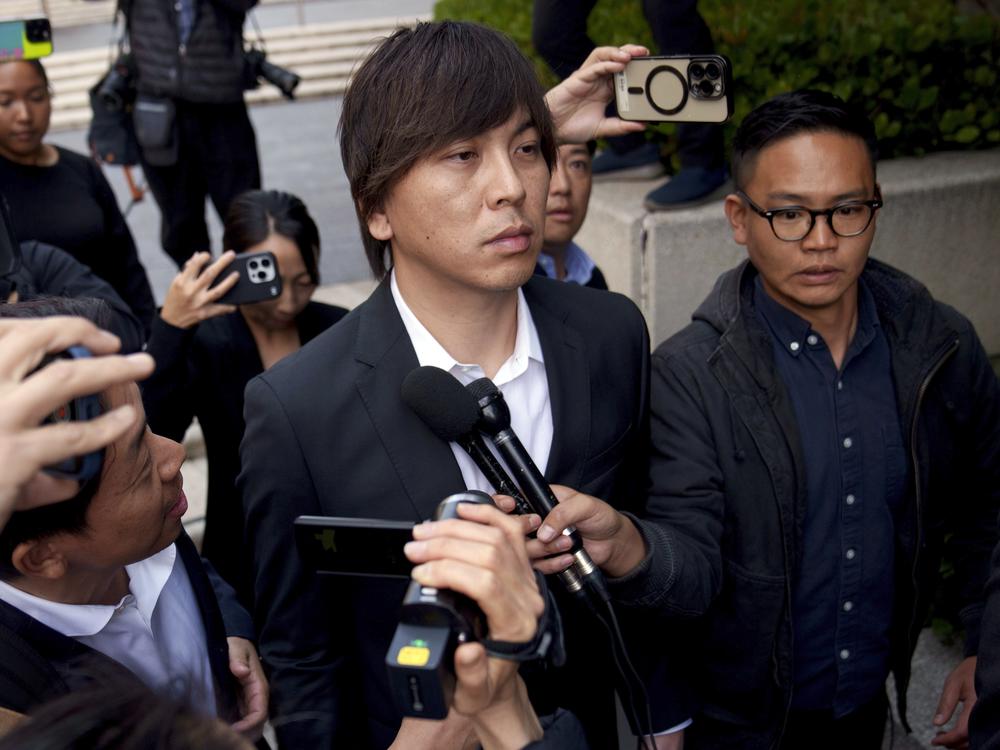Section Branding
Header Content
Shohei Ohtani's ex-interpreter pleads guilty to charges related to gambling and theft
Primary Content
The former interpreter for Los Angeles Dodgers star Shohei Ohtani has pleaded guilty in federal court on charges related to the theft of nearly $17 million from the player to cover gambling debts.
On Tuesday at a federal courthouse in Orange County, Calif., Ippei Mizuhara pleaded guilty to two counts of bank fraud and falsifying a tax return as part of a plea deal with prosecutors reached last month.
For six years, Mizuhara had worked as Ohtani's interpreter and personal assistant after the elite two-way star left his home country of Japan to join the MLB's Los Angeles Angels in 2018.
But in 2021, Mizuhara became entangled in sports gambling. Prosecutors say the interpreter ultimately stole millions of dollars from Ohtani's accounts to pay his debts, taking extraordinary measures to do so — including impersonating Ohtani on phone calls to the bank and modifying the player's bank account to allow Mizuhara direct access to funds.
In court on Tuesday, Mizuhara looked calm and expressionless as the facts of the case were described in court. He faces up to 33 years in federal prison.
"Whether he chose to go to trial or pleaded guilty, we were confident that the evidence would ultimately show Mr. Mizuhara victimized Mr. Ohtani," said Martin Estrada, the U.S. Attorney for the Central District of California, who spoke to reporters after the hearing.
What prosecutors say about Mizuhara's bets
Mizuhara placed around 19,000 bets in just over two years, a rate of about two dozen wagers every day, according to the criminal complaint, which cited a betting record provided to them by a cooperator inside the bookmaking operation. None of Mizuhara's bets were placed on baseball games, prosecutors say.
Mizuhara's bets averaged about $12,800 apiece. In total, Mizuhara lost more than $40 million, court records show.
Prosecutors say Mizuhara wired more than $16 million from Ohtani's checking account to bank accounts associated with an illegal sportsbook. Ohtani has said, both in public statements and in interviews with law enforcement, that he did not authorize the transfers.
Among the evidence tying Mizuhara to the payments are digital forensics connecting Mizuhara's devices and IP addresses to the transfers. Bank records show that security protocols for Ohtani's account were updated to allow access with Mizuhara's mobile phone number and an email address used by Mizuhara, and Ohtani's bank recorded phone calls in which Mizuhara impersonated Ohtani.
Phone records from Mizuhara's device show that he contacted bookmakers regularly beginning in 2021, according to prosecutors. His text messages show the rapidly growing size and frequency of payments for his gambling debt: first $15,000, then $50,000, then $300,000, then half a million each week by 2023.
In the messages, Mizuhara repeatedly acknowledged his losses, records show. "I'm terrible at this sport betting thing huh? Lol," he wrote in November 2022, according to the criminal complaint.
Ippei's bets and the involvement of Ohtani's bank accounts came to light during a federal investigation into the sportsbook, allegedly run by Mathew Bowyer, an Orange County, Calif., resident.
Court records show that a sportsbook based in southern California had been the target of investigation by the IRS and Department of Homeland Security since at least 2023, when a federal judge authorized a search warrant of the bookmaker's home.
What's next for Mizuhara and Ohtani
Mizuhara's sentencing is set for Oct. 25. The bank fraud charge carries a maximum sentence of 30 years in prison and a fine of $1 million, while the charge related to his tax return has a maximum sentence of three years' imprisonment. As part of the plea deal, prosecutors will recommend a lighter sentence. Mizuhara, who was born in Japan, also faces the possibility of deportation after the completion of his federal sentence.
In addition, Mizuhara will also be ordered to pay restitution of $16,975,010 to Ohtani and at least $1.1 million to the IRS.
Ohtani has had little to say about the investigation since March, when the allegations first came to light. Ippei had originally claimed in an interview with ESPN that Ohtani knew of the debts and had agreed to cover them, but he soon retracted that claim.
All parties now say that Ohtani had no knowledge of the debts or payments. Ohtani has cooperated with investigators.
Estrada, the prosecutor, said Tuesday that certain groups of people are especially vulnerable to fraud, including the elderly or immigrants like Ohtani. "He came to this country, was not familiar with the ways of this country, and therefore was easily prey to someone who was more familiar with our financial systems who was able to take advantage of Mr. Ohtani," he said.
"I'm very saddened and shocked that someone who I trusted has done this," Ohtani said at a press conference in March. "I never bet on baseball or any other sports, or never have asked someone to do that on my behalf."
This season, Ohtani has played as a designated hitter while he recovers from Tommy John surgery, a procedure to repair pitchers' elbow ligaments that Ohtani underwent during the offseason. He currently holds the fourth-best batting average in the major leagues.
Reporting contributed by Steve Futterman in Santa Ana, Calif.


